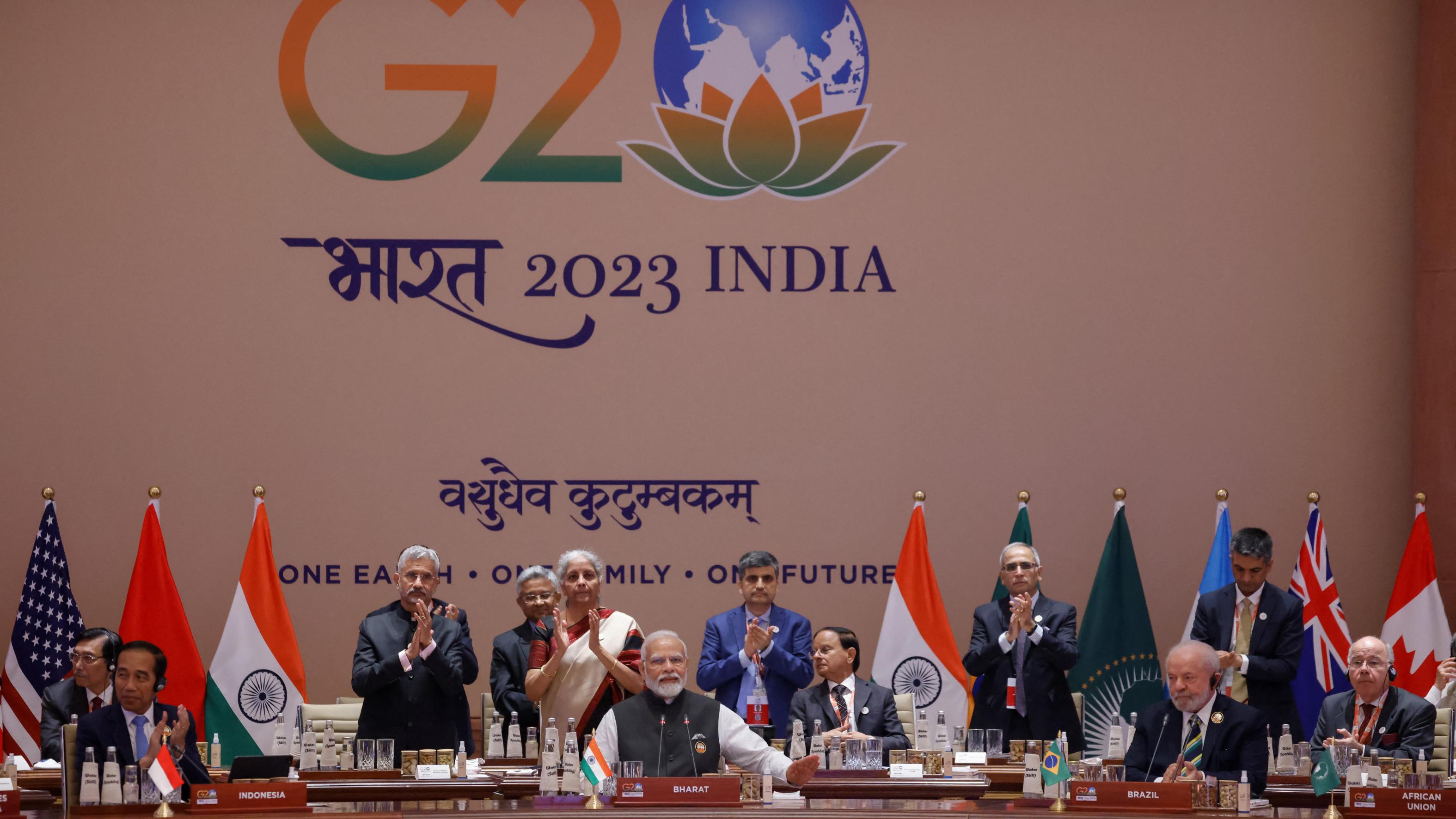 India's Prime Minister Narendra Modi (sixth left) looks on during at the start of the second working session of the G20 Leaders' Summit at the Bharat Mandapam in New Delhi on Sept 9, 2023. (POOL / AFP)
India's Prime Minister Narendra Modi (sixth left) looks on during at the start of the second working session of the G20 Leaders' Summit at the Bharat Mandapam in New Delhi on Sept 9, 2023. (POOL / AFP)
India looks at proposals such as the recently announced India-Middle East-Europe Economic Corridor (IMEC) as an opportunity to push its own infrastructure projects and is therefore happy to go along with them, analysts said.
The announcement of a Memorandum of Understanding (MoU) on the US-backed rail and shipping project came on Sept 9 at the G20 Leaders’ event on the Partnership for Global Infrastructure and Investment, on the sidelines of the G20 Summit in New Delhi.
Beijing has expressed welcome to all infrastructure projects that are to help developing economies and the wish that such projects are not aimed at containing development of a third-party, although some observers see the proposal as a challenge to China’s Belt and Road Initiative, or BRI
Beijing has expressed welcome to all infrastructure projects that are to help developing economies and the wish that such projects are not aimed at containing development of a third-party, although some observers see the proposal as a challenge to China’s Belt and Road Initiative, or BRI.
Counters to the BRI have been in the planning for many years, noted Alka Acharya, honorary director of the Institute of Chinese Studies in New Delhi. This proposal is not necessarily a direct rival to China, she pointed out, adding that "the equations in the Middle East and West Asia are far too complex and not at all amenable to zero-sum calculations”.
ALSO READ: India rejects US report on international religious freedom
"Lack of direct access to Central Asia and beyond circumscribes Indian options, so now it seems India would try to piggyback on the Americans and other players," Acharya added.
India looks at these projects as an opportunity to push its own infrastructure projects and is therefore happy to go along with them, Acharya emphasized.
The IMEC is scheduled to connect India to the Gulf, while the northern corridor will connect the Gulf to Europe, according to the MoU signed by India, the United States, the United Arab Emirates, Saudi Arabia, Germany, France, Italy, and the European Union.
The MoU noted that it would “support an increased emphasis on environmental, social and government impacts.”
While announcing the IMEC, Indian Prime Minister Narendra Modi said it will usher in a new chapter in global connectivity and sustainable development. He also stated that the corridor would act as a "major medium of economic integration between India, West Asia, and Europe”.
ALSO READ: India, US establish new trade group to bolster supply chains
The IMEC makes clear that China’s BRI footprints in Asia, Europe, Africa, and Latin America have forced the US and its allies to innovate ways to connect with the Global South, said B R Deepak, a professor at the Centre of Chinese and Southeast Asian Studies at Jawaharlal Nehru University (JNU) in New Delhi.
But some experts noted that they are doubtful about the viability of the project as many of the IMEC countries are part of the BRI, while Deepak said it also remains to be seen how the participating countries will fund the project.
China also sees its cooperation with the Arab and Africa as an example of South-South cooperation, Deepak said, noting the depth and breadth of this engagement could be gauged by China-Arab trade that has grown to US$300 billion.
The corridor will enhance interregional cooperation and connectivity by reducing the strategic gap between Asia and Europe, which will benefit India, said Jagannath Panda, head of the Stockholm Center for South Asian & Indo-Pacific Affairs at the Institute for Security and Development Policy in Sweden.
ALSO READ: India 'concerned about' US package for Pakistan F-16 jets
The Middle East becomes the bridging zone between Asia and Europe, Panda said, and India would emerge stronger as a growth pole in the intercontinental cooperation framework.
China’s Foreign Ministry said on Monday that it welcomes all initiatives that truly help developing countries build infrastructure and sincere efforts to promote connectivity and common development.
“At the same time, we advocate that various connectivity initiatives should be open, inclusive, and form synergy, and should not become geopolitical tools,” the ministry said.
Since its exit from Iraq in 2011, the US has not been in a position to reestablish its influence and control in West Asia, said A K Mohapatra, a professor at the Centre for West Asian Studies at JNU’s School of International Studies.
READ MORE: India: EU carbon tax may hit exports of metal and cement
The US has been looking for strategic partners first of all to retain its influence in the region and second to prevent the region from being inclined to China, Mohapatra added.
The writer is a freelance journalist for China Daily.


